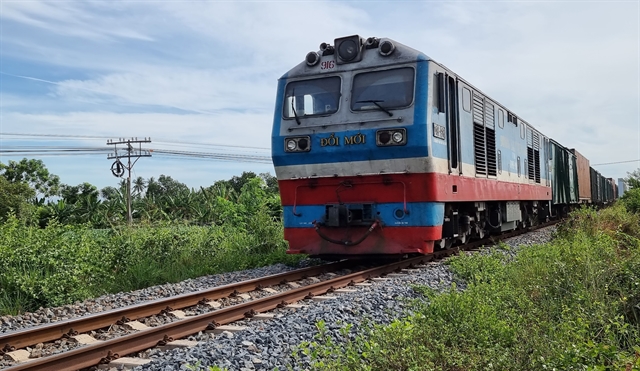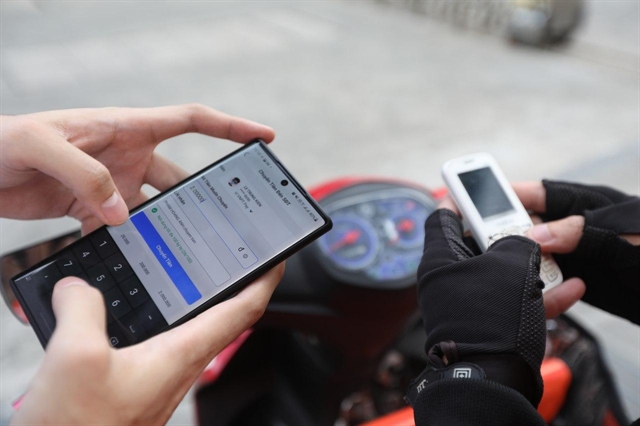 Economy
Economy
.jpg)
An ecosystem for cashless payment is essential for Việt Nam to encourage people to switch from cards to contactless and digital payment, an important factor in the country’s digital transformation.

|
| A person uses a smartphone to make a money transfer. The COVID-19 pandemic is providing a significant opportunity for accelerating cashless payment in Việt Nam. — VNA/VNS Photo |
HÀ NỘI — An ecosystem for cashless payment is essential for Việt Nam to encourage people to switch from cards to contactless and digital payment, an important factor in the country’s digital transformation.
The COVID-19 pandemic has seriously affected the economy and changed the way we pay, with people forgoing cash in favour of contactless payment.
National Payment Corporation of Việt Nam statistics show that around 1.86 billion cashless payment transactions worth VNĐ23.6 quadrillion were made in 2021, rising by 169 per cent and 164 per cent, respectively, compared to 2020 and 2019.
Thu Hiền, from Gò Vấp District, HCM City, said online shopping and payment were becoming more popular and convenient.
Hiền said previously she had to go to her children’s schools to pay for their tuition, but the schools now accepted bank transfers and even e-wallet payments.
According to Nguyễn Anh Đức, general director of Saigon Co.op, the supermarket chain saw the percentage of customers making cashless payments increase from 4 to 40 per cent during the pandemic.
Saigon Co.op’s survey showed that around 32 per cent of consumers were in favour of cashless payments, and 17 per cent said they would make more cashless payments in the future.
Although there were positive results in cashless payment since the pandemic, Việt Nam still faces difficulties expanding cashless payment as cash habits still dominate, and people are worried about security.
Thùy Trang, owner of a fruit store in Tân Phú District, said more than 95 per cent of orders at her store when strict social distancing measures were in place were cashless. However, she said there was a drop in cashless payment since the city returned to normal.
According to Cấn Văn Lực, a senior expert of the Bank for Investment and Development of Việt Nam, Việt Nam is among countries with a rapid increase in electronic payment in the region.
However, attention must be paid to speeding up the development of information technology and telecoms infrastructure, national databases and data-sharing to promote cashless payment.
Banks, financial technology, e-wallets, and telecoms were racing to build non-cash payment ecosystems to encourage consumers to forgo cash and switch to contactless and payment.
Late last year, the State Bank of Việt Nam gave the nod to two telecom operators, MobiFone and Vinaphone, to pilot Mobile Money, which allows payments of small sums via telecom accounts.
In early December, telecom operator Viettel introduced the digital financial ecosystem Viettel Money, which was expected to accelerate cashless payment in Việt Nam.
Financial expert Nguyễn Trí Hiếu said that Mobile Money would help more people in remote areas without bank accounts to make cashless payments with greater convenience.
According to Deputy Minister of Information and Communications Phạm Đức Long, about 50 per cent of the population do not have bank accounts and most use cash for payments worth less than VNĐ100,000.
Mobile Money will help expand cashless payment to most people, especially rural, mountainous and remote areas where banking and e-wallets services are not popular.
The project on the development of cashless payments in Việt Nam for 2021-25 is creating a crucial legal framework for the development of the cashless payment ecosystem.
Governor of the State Bank of Việt Nam Nguyễn Thị Hồng said that the central bank would improve the legal framework on cashless payment and fintech sandboxes to promote cashless payment.
In addition, the infrastructure will be improved to enable linkage between banks and payment intermediaries with goods and services providers ensuring instant processing and round-the-clock operation. — VNS
.jpg)



